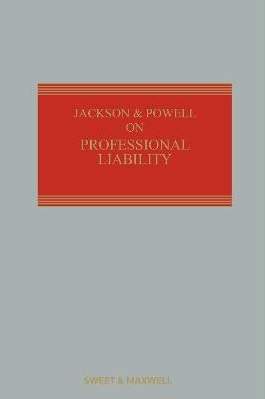Description
Key features
- Examines the nature of professional liability
- Deals with subjects of general application and delves into specific professions
- Discusses the difference between tortious liability and contractual liability
- Considers the duties and obligations of a professional including positive duties and restrictions
- Considers the standard of skill and care including the relevance of the defendant’s qualifications and experience
- Discusses changes in the standard required by professional
- Explains the nature of a fiduciary duty including unauthorised profits and undue influence
- Discusses the origins of the duty of confidentiality including the continuing duty to former clients
- Differentiates between limitation in contract, tort and equity
The new edition addresses all key developments and case law that have evolved since publication of previous edition. It includes several significant new cases and developments, including the following:
Insurance. In Lord Bishop of Leeds v Dixon Coles & Gill the Court of Appeal gave further guidance in relation to aggregation. It held that liabilities to different clients arising from thefts from the insured firm’s client account by a partner should not be aggregated as they did not arise out of a series of related acts or omissions.
Scope of duty. The decisions of the Supreme Court in Manchester Building Society v Grant Thornton UK LLP, an accountants’ case, and Meadows v Khan, a medical case, provide significant guidance and refinement of the scope of duty principle, concentrating on the purpose of the advice objectively construed. This is relevant to claims against most professionals.
Surveyors. In Hart v Large the Court of Appeal upheld a decision that a negligent surveyor was liable for the difference in value between the purchase price and the actual value of the property with all the defects, including latent defects, as his advice should have advised that there were risks which could not be assessed.
Lawyers: In Harcus Sinclair llp v Your Lawyers Ltd the Supreme Court has for the first time reviewed the law on solicitors’ undertakings. It has provided significant further guidance on the questions to be asked to determine whether an undertaking was given as a solicitor.
Financial practitioners. Adams v Options SIPP UK LLP has significant ramifications for execution only SIPP providers. The Court of Appeal reviewed earlier High Court authority to the effect that the giving of mere information may constitute advice where the provision of information is itself the product of a selection process involving a value judgment.
The 9th edition, published in December 2021, is now supplied as a set inclusive of the 1st Supplement published in December 2022. The supplement updates the main-work with the latest changes and new case law
- Contents:
- Chapter 1: The Nature of Professional Liability
- Chapter 2: Duties and Obligations
- Chapter 3: Remedies
- Chapter 4: Contribution between Defendants
- Chapter 5: Defences
- Chapter 6: Litigation
- Chapter 7: Human Rights and Judicial Review in Professional Liability
- Chapter 8: Professional Indemnity Insurance
- Chapter 9: Construction Professionals
- Chapter 10: Surveyors
- Chapter 11: Solicitors
- Chapter 12: Barristers
- Chapter 13: Medical Practitioners
- Chapter 14: Regulation of Financial Services
- Chapter 15: Financial Practitioners
- Chapter 16: Insurance Brokers
- Chapter 17: Accountants and Auditors
- Chapter 18: Actuaries
- Chapter 19: Members’ and Managing Agents at Lloyd’s
- Chapter 20: Information Technology Professionals
- Chapter 21: Patent Attorneys and Trade Mark Attorneys
- Chapter 22: Art Professionals


Reviews
There are no reviews yet.